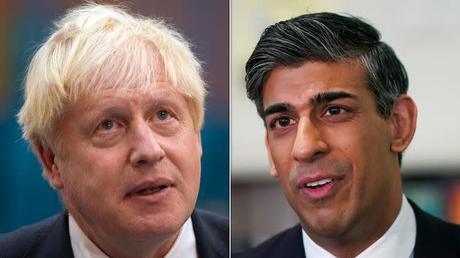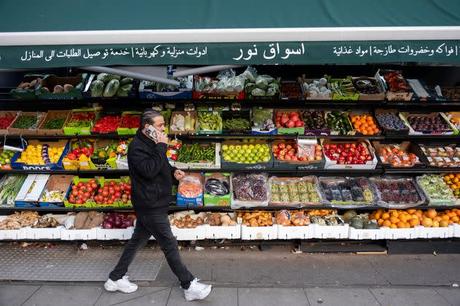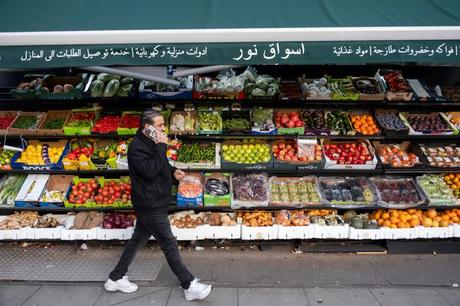
Boris Johnson and Rishi Sunak campaigned for Brexit
New Brexit checks on EU goods entering Britain are about to come in - but who cares?
While we left the EU in January 2020, the government has abandoned this particular part of the exit deal for years.
It means imported food will become more expensive and shortages could arise, contrary to original Brexit promises, while importers could face delays.
But after five separate attempts to delay this legislation, the government must now make the checks a reality.
What are the new checks?
From January 31, 2024, fresh products will face new border controls in the new Border Target Operating Model.
It will be introduced in three phases.
Firstly, from Wednesday, EU exports of animal and plant products will have to submit Export Health Certificates to the British authorities.
It means importers must notify authorities a day before they arrive in Britain.
Currently, the EU does not need to notify the UK government before bringing in meat and dairy, so they can arrive quickly.
Physical checks on shipments will then start from April 30 and from October 31, shipments must meet safety and security certificates.
What impact will these controls have?
Price increasesThe price of imported food (especially meat and dairy) will rise.
Director General of the Institute for Export and International Trade - Marco Forgione - told Reuters that large companies should be able to cope, but smaller companies may struggle to cope with the changes.
He added that small businesses could then stop trading with Britain, leading to "price pressures and the possibility of shortages".
Some EU exporters are not ready to deal with this new amount of legislation and may not want to pay the additional costs of trade controls.
Each shipment can cost between £20 and £43, and there are usually several on each truck.
The total estimated cost of these costs is expected to be £330 million per year - and any higher costs mean food prices will rise, potentially leading to food inflation.
The story continues


Exhibition of fresh fruit and vegetables outside a shop on Edgware Road on December 6, 2023 in London, United Kingdom.
Delays and shortagesThe EU effectively imposed the same restrictions on British (GB) goods entering the bloc in January 2021.
This led to enormous delays at the ports and some British exporters even stopped selling to the EU for the time being.
William Bain, head of trade policy at the British Chambers of Commerce, warned that the slowdowns would only really be felt from April onwards.
Britain imports up to 70% of its fresh food from the EU in the winter months, dropping to around 30% in the warmer months, with as many as 1,000 trucks arriving at ports every day.
Delays can therefore shorten the shelf life of fresh food by a fifth.
The SPS certification working group, which represents 30 trade bodies and accounts for £100 billion of the UK's food supply, described these new rules as "unfeasible".
In a letter to the Secretary of State for Environment, Food and Rural Affairs, Steve Barclay, the experts said this would have serious implications for the "just-in-time supply to Britain of perishable, short-lived fresh food/ingredients sourced from the UK." EU".
Veterinarians in the EU also have to sign off on the products - and there are fears there may not be enough to meet demand.
Confusion about how it will workAccording to industry experts, there is also a lack of transparency in the government.
Bain told Reuters: "Will the government take enforcement action by preventing material that does not have an electronic EHC from entering the UK border? Or does it let things in and then simply enforce them through contact with the companies involved?
"The government doesn't tell us what they're going to do."
Others fear Britain has no capacity.
Horticultural Trades Association chairman James Barnes said there was a risk that Britain's new border infrastructure, processes and IT systems would not be ready by April.
The Dutch Association of Floricultural Wholesalers also called for a postponement of British border controls until 2025, but this was ignored.
The start date is just thirteen weeks away, but the government has not yet released details of the opening hours of its border posts.
Is this what we were promised?
Not exactly.
As BBC Newsnight's Victoria Derbyshire, a prominent Brexiter, pointed out Jacob Rees-Mogg promised that there would be cheaper food, and ex-prime minister Boris Johnson promised there would be no additional trade controls - but "both were wrong".
Rees-Mogg even called introducing such checks was an "act of self-harm" in 2022, when he was Brexit options minister.
Why are they being introduced now?
The government has postponed this to avoid disruption of the ports and to prevent the situation from worsening cost of living.
But they are now being introduced because of biohazards, warning of the impact of outbreaks of diseases such as foot and mouth disease, according to Newsnight reporting.
These controls will also help maintain competitiveness between Britain and their EU counterpart, as the bloc unveiled such controls shortly after Britain effectively left the bloc.
How has the government responded?
The government claims everything is on track to be ready in April and there will be no delays.
According to The Guardian, a government spokesperson said: "We remain committed to delivering the world's most advanced border.
"The border-centric operating model is vital to achieving this, protecting UK biosecurity from potentially harmful pests and diseases, and maintaining confidence in our exports.
"We have worked extensively with traders to ensure the new controls and requirements are clear and not burdensome. Therefore, low-risk products are not subject to additional certification or controls, while medium-risk products will undergo fewer controls, minimizing the risk of delays.
"We will continue to work closely with businesses across the UK as controls are implemented."
